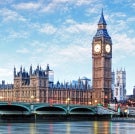Five cruise lines under the Carnival brand have been named by an eco group as the least environmentally friendly cruise companies, such as failing to deliver in how it treats its onboard sewage and reduce air pollution in certain areas.
Environmental organisation Friends of the Earth sifted through 243 cruise ships operated by 21 cruise lines worldwide and ranked them based on four criteria.
The organisation looked at how ships treated their sewage and graywater through what advanced systems it installed instead of dumping treated sewage into the water.
It looked at whether a cruise line has retrofitted its ships to “plug in” to shoreside electrical grids instead of running its engines when docked or if it uses low sulfur fuel, to reduce air pollution.
Friends of the Earth also checked if the ships use scrubbers, an exhaust gas cleaning device that “converts air pollution into toxic wastewater”, as defined by Friends of the Earth.
Sulphur emitted by ships can be processed by a scrubber, which in turn discharges as a liquid which contains pollutant properties which have been found to pose a risk to sea life.
The organisation also ranked the companies as well on whether it was transparent, responding to its request for information.
At the bottom of the table, with average grades of ‘F’ were brands all under the Carnival name: Seabourn, Cunard, Carnival Cruise Lines, P&O Cruises and Costa Cruises.
The organisation said that the luxury Seabourn line, which was more environmentally friendly than some of the others in the five, did have advanced sewage systems, but failed to deliver in reducing air pollution as five of its ships’ exhausts were fitted with scrubbers.
P&O Cruises were found to have four out of its seven ships with advanced sewage systems, but the organisation says two of its ships burn liquefied natural gas fuel, which emits a lot of greenhouse gas emissions.
Costa similarly, only has two out of its nine ships fitted with sewage systems that are better for the environment, but eight of its ships were found to have exhaust gas scrubbers.
The luxury cruise company Cunard was also awarded an F by the organisation, finding that only one out of its four ships, the Queen Mary 2, could plug into shore power hookups, but all four did have advanced sewage systems, giving them a C grade in that aspect.
Carnival Cruise Line also came in joint fifth with its fellow brands, with the organisation finding that 24 out of 27 ships had scrubbers and that around half of its fleet, 13, had been installed with advanced sewage treatment systems.
At the other end of the table, Norwegian cruise Hurtigruten and expedition line HX came joint first on the table with a score of B+, having impressed Friends of the Earth with its ability to plug into electricity when docking and not using scrubbers in the exhausts.
Although Friends of the Earth did not independently verify every ship, it collected data from the internet, government sources, the cruise industry and other public sources.
In a statement to The Independent, a spokesperson from Carnival Corp said: “Our success – and quite literally, our livelihood – depends on doing our part to protect this incredible planet we call home. Carnival Corporation & plc has a demonstrated multi-decade commitment to sustainable and responsible cruise operations.
“We’ve invested hundreds of millions of dollars in environmental technologies and solutions, which together with our other decisive climate actions are yielding strong results. For example, we’re producing 10+ per cent less total GHG emissions today than our peak historical year in 2011 (despite increasing our capacity since that time), and we’re on track to have cut our GHG emissions per lower berth capacity by 40+ per cent by 2026 (vs. 2008 levels), which is ahead of the IMO’s 2030 carbon intensity reduction timeline.”
“We’re also making meaningful progress toward reducing our environmental impact in other areas and invite your readers to learn more by checking out our Sustainability Report published annually on our corporate website.”
Cruise Lines International Association, the world’s largest cruise industry trade association, also said that the report “unfortunately lacks any scientific basis and presents opinion as fact, which is a distraction and disservice to the advancements the cruise industry has made aligned with the IMO strategy to achieve net zero emissions by 2050.”
“The cruise industry is building the future of sustainable cruise travel today, investing billions in new ships, new technologies and new product enhancements that are making the global cruise line fleet more efficient each year, a spokesperson told The Independent.
“These investments – from shoreside electricity to engines that are increasingly able to utilize synthetic and advanced biofuels and other low- to zero-emissions energy sources – are driving meaningful reductions in emissions as cruise lines have reduced their use of heavy fuels from 74 per cent in 2019 to 56 per cent in 2023.
“We are proud of the progress we’ve made as an industry, and we are constantly exploring opportunities to further accelerate our efforts.”
For more travel news and advice, listen to Simon Calder’s podcast
Source: independent.co.uk



